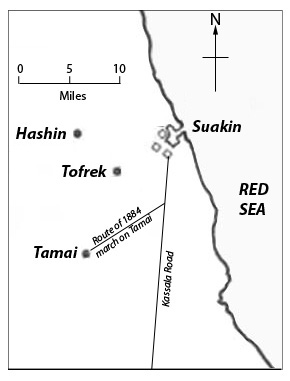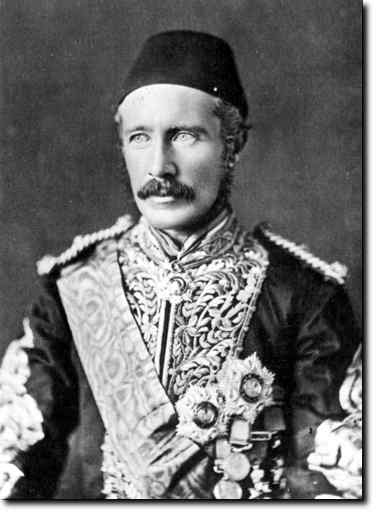|
Suakin Expedition
The Suakin Expedition was either of two British-Indian military expeditions, led by Major-General Sir Gerald Graham, to Suakin in Sudan, with the intention of destroying the power of the Sudanese military commander Osman Digna and his troops during the Mahdist War. The first expedition took place in February 1884 and the second in March 1885. First expedition The first expedition, in February 1884, led to several notable British victories, among them the Second Battle of El Teb and the Battle of Tamai. Second expedition Following the fall of Khartoum on 26 January 1885, Graham led a second expedition in March 1885. This expedition is sometimes referred to as the Suakin Field Force. Its purpose was to defeat Mahdist forces under Osman Digna in the region and to supervise and protect the construction of the Suakin-Berber Railway. A week after its arrival in Suakin, the expedition fought in two actions: the Battle of Hashin on 20 March, and the Battle of Tofrek The Battle ... [...More Info...] [...Related Items...] OR: [Wikipedia] [Google] [Baidu] |
Ernest Gambier-Parry
Major Ernest Gambier-Parry (25 October 1853 – 15 April 1936) was a British military officer who participated in an expedition to the Sudan to avenge the grisly death of a renowned general in 1885. However, the wounds he sustained in that campaign ended his military career. Gambier-Parry was also known for his work as an author, musician, and artist. He succeeded to the manor at Highnam Court following the death of his half-brother Sir Hubert Parry. In addition, he preserved and archived the art collection that had been amassed by his father Thomas Gambier Parry; the masterpieces were eventually bequeathed to the Courtauld Institute of Art. Background Ernest Gambier-Parry, son of Thomas Gambier-Parry and his second wife Ethelinda Lear, was born on 25 October 1853 at Highnam Court, Highnam, Gloucestershire. His father was an artist, philanthropist, and art collector. His half-brother was the composer Sir Hubert Parry, Thomas Gambier-Parry's son by his first wife Anna Maria I ... [...More Info...] [...Related Items...] OR: [Wikipedia] [Google] [Baidu] |
Suakin-Berber Railway
The Suakin-Berber railway on the Red Sea coastal region in Sudan was a short-lived military project that never reached completion. Its construction began in February 1885, being intended to provide a connection between Berber on the River Nile and Suakin on the Red Sea littoral for the rapid deployment of troops and military equipment in Britain’s involvement in the Mahdist war. In May 1885, after barely three of months of work during which only 20 of the intended 280 miles of track had been laid, at a cost approaching £1 million, Britain suspended its war with the Mahdi, pulled out of the Sudan and terminated the Suakin-Berber railway. The escalating difficulties and costs of building the railway served to provide ammunition to Gladstone's opponents in Parliament and in so doing helped in bringing down his second administration. Background In 1883 Britain became involved in hostilities against the Mahdi revolt, sending General Gordon to Khartoum to organize the evacuati ... [...More Info...] [...Related Items...] OR: [Wikipedia] [Google] [Baidu] |
Conflicts In 1884
Conflict may refer to: Social sciences * Conflict (process), the general pattern of groups dealing with disparate ideas * Conflict continuum from cooperation (low intensity), to contest, to higher intensity (violence and war) * Conflict of interest, involvement in multiple interests which could possibly corrupt the motivation or decision-making * Cultural conflict, a type of conflict that occurs when different cultural values and beliefs clash * Ethnic conflict, a conflict between two or more contending ethnic groups * Group conflict, conflict between groups * Intragroup conflict, conflict within groups * Organizational conflict, discord caused by opposition of needs, values, and interests between people working together * Role conflict, incompatible demands placed upon a person such that compliance with both would be difficult * Social conflict, the struggle for agency or power in something * Work–family conflict, incompatible demands between the work and family roles of ... [...More Info...] [...Related Items...] OR: [Wikipedia] [Google] [Baidu] |
Herbert Kitchener, 1st Earl Kitchener
Field Marshal Horatio Herbert Kitchener, 1st Earl Kitchener (; 24 June 1850 – 5 June 1916) was a British Army officer and colonial administrator. Kitchener came to prominence for his imperial campaigns, his involvement in the Second Boer War, and his central role in the early part of the First World War. Kitchener was credited in 1898 for having won the Battle of Omdurman and securing control of the Sudan, for which he was made Baron Kitchener of Khartoum. As Chief of Staff (1900–1902) in the Second Boer WarAnon."Kitchener of Khartoum, Viscount" in ''Debrett's peerage, baronetage, knightage, and companionage'', London: Dean & Son, 1903, p. 483-484. he played a key role in Lord Roberts' conquest of the Boer Republics, then succeeded Roberts as commander-in-chief – by which time Boer forces had taken to guerrilla fighting and British forces imprisoned Boer and African civilians in concentration camps. His term as commander-in-chief (1902–1909) of the Army in India ... [...More Info...] [...Related Items...] OR: [Wikipedia] [Google] [Baidu] |
Brevet (military)
In military terminology, a brevet ( or ) is a warrant which gives commissioned officers a higher military rank as a reward without necessarily conferring the authority and privileges granted by that rank. The promotion would be noted in the officer's title (for example, "Bvt. Maj. Gen. Joshua L. Chamberlain" or "Bvt. Col. Arthur MacArthur"). It is not to be confused with a '' Brevet d'état-major'' in Francophone European military circles, where it is an award, nor should it be confused with temporary commissions. France In France, ''brevet'' is a word with a very broad meaning, which includes every document giving a capacity to a person. For instance, the various military speciality courses, such as military parachutism, are ended by the award of a brevet. The more important brevet in the French military is that of the École de guerre (''lit''. "school of war"), the French Staff College. Between 1870 and 1940, an ''officier breveté'' was a graduate of the ''École ... [...More Info...] [...Related Items...] OR: [Wikipedia] [Google] [Baidu] |
William Ewart Gladstone
William Ewart Gladstone ( ; 29 December 1809 – 19 May 1898) was a British politican, starting as Conservative MP for Newark and later becoming the leader of the Liberal Party (UK), Liberal Party. In a career lasting over 60 years, he was Prime Minister of the United Kingdom for 12 years, spread over four non-consecutive terms (the most of any British prime minister) beginning in 1868 and ending in 1894. He also was Chancellor of the Exchequer four times, for over 12 years. He was a Member of Parliament (United Kingdom), Member of Parliament (MP) for 60 years, from 1832 to 1845 and from 1847 to 1895; during that time he represented a total of five Constituencies of the Parliament of the United Kingdom, constituencies. Gladstone was born in Liverpool to Scottish people, Scottish parents. He first entered the House of Commons of the United Kingdom, House of Commons in 1832, beginning his political career as a High Tory, a grouping that became the Conservative Party (UK), ... [...More Info...] [...Related Items...] OR: [Wikipedia] [Google] [Baidu] |
New South Wales Contingent
The New South Wales Contingent served in Sudan with British forces as part of the Suakin Expedition in 1885. Consisting of an infantry battalion, an artillery battery, and a small field ambulance detachment, it departed from Sydney on 3 March 1885. Arriving at Suakin on 29 March it ultimately saw little action, being involved in a minor action at Tamai on 3 April, and another at Takdul on 6 May. However, with the British deciding to abandon the campaign it re-embarked on 17 May and returned to Sydney on 19 June 1885, where it was disbanded. The New South Wales Contingent was the first military contingent to be raised and deployed overseas by an Australian colony. History During the early years of the 1880s, an Egyptian regime in the Sudan, backed by the British, came under threat from rebellion under the leadership of native Muhammad Ahmad (or Ahmed), known as Mahdi to his followers. In 1883, as part of the Mahdist War, the Egyptians sent an army to deal with the revolt, but they ... [...More Info...] [...Related Items...] OR: [Wikipedia] [Google] [Baidu] |
Battle Of Tofrek
The Battle of Tofrek was fought on 22 March 1885 some 5 miles inland from the port of Suakin on the Red Sea coast of Sudan. A contingent of some 3,000 troops from the British and Indian Suakin Expedition#Second expedition, "Suakin Field Force" led by Major General John McNeill (British Army officer), Sir John Carstairs McNeill (under the overall command of General Gerald Graham) was attacked by a Mahdist War, Mahdist force under the leadership of Osman Digna. The Mahdists were heavily defeated, losing some 1,000 of their 2,000 fighters as compared to the loss of 70 British and Indian soldiers plus over 100 casualties. Background The sacking of Khartoum and the killing of Charles George Gordon, General Gordon and the massacre of thousands of civilians at the hands of Muhammad Ahmad, Mahdist warriors in January 1885, together with the failure of the relief effort of Garnet Wolseley, 1st Viscount Wolseley, General Wolseley's Nile Expedition, prompted the British government to revive ... [...More Info...] [...Related Items...] OR: [Wikipedia] [Google] [Baidu] |
Battle Of Hashin
A battle is an occurrence of combat in warfare between opposing military units of any number or size. A war usually consists of multiple battles. In general, a battle is a military engagement that is well defined in duration, area, and force commitment. An engagement with only limited commitment between the forces and without decisive results is sometimes called a skirmish. The word "battle" can also be used infrequently to refer to an entire operational campaign, although this usage greatly diverges from its conventional or customary meaning. Generally, the word "battle" is used for such campaigns if referring to a protracted combat encounter in which either one or both of the combatants had the same methods, resources, and strategic objectives throughout the encounter. Some prominent examples of this would be the Battle of the Atlantic, Battle of Britain, and the Battle of France, all in World War II. Wars and military campaigns are guided by military strategy, whereas batt ... [...More Info...] [...Related Items...] OR: [Wikipedia] [Google] [Baidu] |
Muhammad Ahmad
Muhammad Ahmad bin Abdullah bin Fahal (; 12 August 1843 – 21 June 1885) was a Sudanese religious and political leader. In 1881, he claimed to be the Mahdi and led a war against Egyptian rule in Sudan, which culminated in a remarkable victory over them in the Siege of Khartoum. He created a vast Islamic state extending from the Red Sea to Central Africa and founded a movement that remained influential in Sudan a century later. From his announcement of the Mahdist State in June 1881 until its end in 1898, Holt, P.M.: "The Mahdist State in Sudan, 1881–1898". Oxford: Clarendon Press, 1970. p. 45. the Mahdi's supporters, the Ansār, established many of its theological and political doctrines. After Muhammad Ahmad's unexpected death from typhus on 22 June 1885, his chief deputy, Abdallahi ibn Muhammad took over the administration of the nascent Mahdist State. The Mahdist State, weakened by his successor's autocratic rule and inability to unify the populace to resist the ... [...More Info...] [...Related Items...] OR: [Wikipedia] [Google] [Baidu] |
Gerald Graham
Lieutenant General Sir Gerald Graham, (27 June 1831 – 17 December 1899) was a senior British Army commander in the late 19th century and an English recipient of the Victoria Cross, the highest award for gallantry in the face of the enemy that can be awarded to British and Commonwealth forces. As an officer of the Royal Engineers, he served in the Crimean War, China, Canada, and Africa — including as a Brigadier General in the Anglo-Egyptian War and as commander of the Suakin Expedition against Mahdist Sudan in 1884–85. In February 1884, Graham accompanied his close friend and colleague Charles George Gordon up the Nile to Gordon's disembarkation at Korosko, making Graham one of the last Englishmen to see Gordon alive before he set out across the Nubian Desert on his fateful mission to Khartoum. In 1887 Graham commemorated Gordon, reflecting on his life, character, and the context of the Mahdist War, in a publication entitled “Last Words with Gordon”. Early life G ... [...More Info...] [...Related Items...] OR: [Wikipedia] [Google] [Baidu] |
Siege Of Khartoum
The siege of Khartoum (also known as the battle of Khartoum or fall of Khartoum) took place from 13 March 1884 to 26 January 1885. Mahdist State, Sudanese Mahdist forces captured the city of Khartoum, Sudan, from its Khedivate of Egypt, Egyptian garrison, thereby gaining control over the whole of Turco-Egyptian Sudan. Egypt had Turco-Egyptian conquest of Sudan (1820–1824), conquered Sudan in 1820, but had itself come under History of Egypt under the British, British domination in 1882. In 1881, the Mahdist War began in Sudan, led by Muhammad Ahmad who claimed to be the Mahdi. The Egyptian Army was unable to suppress the revolt, being defeated in several battles and retreating to their garrisons. The British refused to send a military force to the area, instead appointing Charles George Gordon as Governor-General of Sudan, with orders to evacuate Khartoum and the other garrisons. Gordon arrived in Khartoum in February 1884, where he found it impossible to reach the other garri ... [...More Info...] [...Related Items...] OR: [Wikipedia] [Google] [Baidu] |








